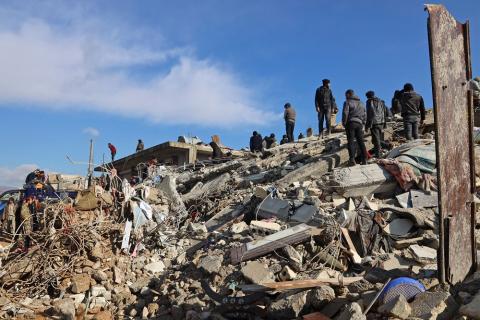
The UN Security Council mandate allowing trucks of aid to enter Syria via Turkey is due to expire on July 10
BEIRUT: People living in Syria’s battered northwest could die of malnutrition or lack of water if Russia vetoes UN authorization for cross-border aid, an aid official said on Wednesday.
The UN Security Council mandate allowing trucks of aid to enter Syria via Turkey is due to expire on July 10. But Syrian ally Russia has hinted it may veto, prompting fears of a cut-off as Syrians grapple with drought and growing food insecurity.
Mark Cutts, deputy UN regional humanitarian coordinator, told Reuters the “eyes of the world have turned away from Syria” precisely when it most needs outside help.
“If the resolution is not renewed, we know that many people are going to suffer, people are going to die,” he said.
Around 4.4 million Syrians live in the northwestern enclave controlled by Turkish-backed groups and hard-line Islamist militants and virtually all of them — 4.1 million — need humanitarian assistance, the United Nations says.
One in three children are under-nourished and many rely on therapeutic feeding made possible by cross-border aid, he said.
“Many are in hospitals that will no longer get the medical aid they need, vaccination programs will be affected,” he said, adding that water being trucked in to hundreds of thousands of people living in camps may not reach them.
Since the Security Council first authorized cross-border aid in 2014, Russia has repeatedly threatened to veto extensions or amend language to curtail operations, arguing they violate Syria’s sovereignty and territorial integrity and that more help should be delivered from within the country.
“The stakes are higher this year with the war in Ukraine and the tensions in the Security Council,” Cutts said.
Needs have meanwhile hit an all-time high, with more displaced families pouring into the zone, Syria’s economy deteriorating, the COVID-19 pandemic and the spike in food prices worldwide.
Cross-border military operations threatened by Turkey to oust Kurdish-led forces from some areas in the north would only add to the suffering, aid groups have warned.
Funding has also dried up, with donor countries spread thin by crises in Ukraine, Afghanistan, Ethiopia, Myanmar and Yemen. The UN says it has only received a quarter of the $4.4 billion needed for aid operations to continue.
“The crisis is now worse than it’s ever been,” Cutts said.











